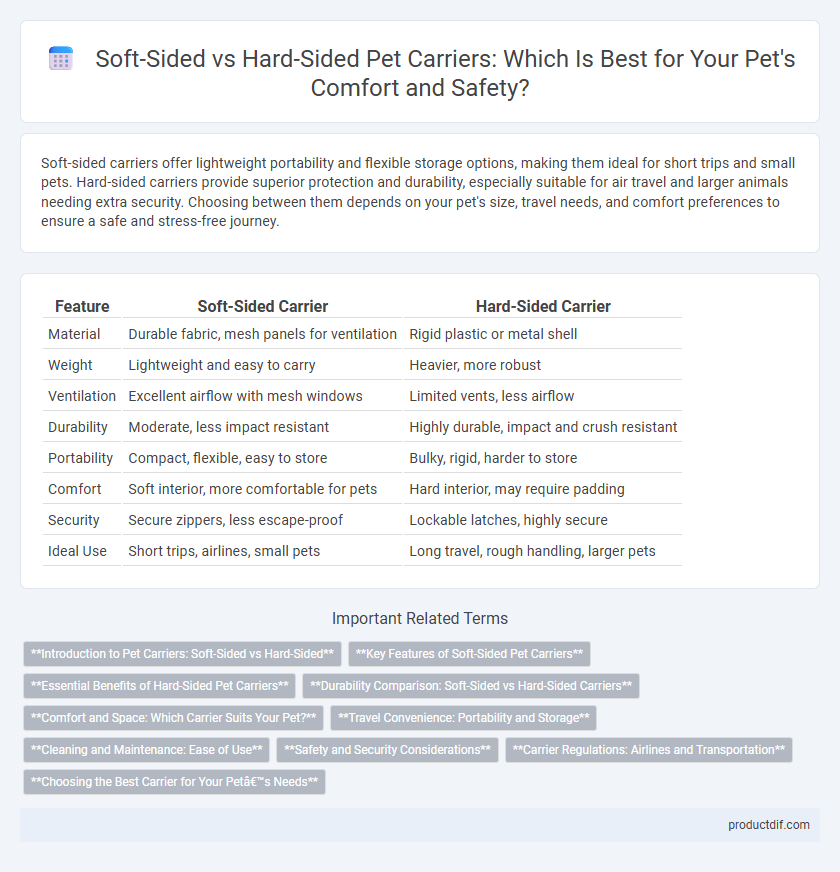Soft-sided carriers offer lightweight portability and flexible storage options, making them ideal for short trips and small pets. Hard-sided carriers provide superior protection and durability, especially suitable for air travel and larger animals needing extra security. Choosing between them depends on your pet's size, travel needs, and comfort preferences to ensure a safe and stress-free journey.
Table of Comparison
| Feature | Soft-Sided Carrier | Hard-Sided Carrier |
|---|---|---|
| Material | Durable fabric, mesh panels for ventilation | Rigid plastic or metal shell |
| Weight | Lightweight and easy to carry | Heavier, more robust |
| Ventilation | Excellent airflow with mesh windows | Limited vents, less airflow |
| Durability | Moderate, less impact resistant | Highly durable, impact and crush resistant |
| Portability | Compact, flexible, easy to store | Bulky, rigid, harder to store |
| Comfort | Soft interior, more comfortable for pets | Hard interior, may require padding |
| Security | Secure zippers, less escape-proof | Lockable latches, highly secure |
| Ideal Use | Short trips, airlines, small pets | Long travel, rough handling, larger pets |
Introduction to Pet Carriers: Soft-Sided vs Hard-Sided
Soft-sided pet carriers offer lightweight, flexible designs with breathable mesh panels, making them ideal for small pets and air travel. Hard-sided carriers provide rigid protection, durable materials, and secure locks, suited for larger pets and rough handling. Choosing between soft-sided and hard-sided carriers depends on pet size, travel type, and durability requirements.
Key Features of Soft-Sided Pet Carriers
Soft-sided pet carriers feature lightweight, flexible materials such as durable nylon or polyester, providing breathable mesh panels for ventilation and visibility. These carriers often include multiple pockets for storage, padded shoulder straps for comfort, and collapsible designs for easy storage. Their soft construction allows for enhanced portability and adaptability, making them ideal for small pets and frequent travelers.
Essential Benefits of Hard-Sided Pet Carriers
Hard-sided pet carriers offer superior protection and durability, making them ideal for travel and aviation compliance. Their rigid structure prevents crushing and provides enhanced safety during impact or rough handling. Ventilation panels and secure locking mechanisms ensure pets remain comfortable and secure throughout the trip.
Durability Comparison: Soft-Sided vs Hard-Sided Carriers
Hard-sided carriers offer superior durability with rigid walls made from materials like plastic or metal, providing better protection against impacts and wear. Soft-sided carriers, while more flexible and lightweight, tend to be less resistant to tears, punctures, and environmental damage over time. For pet owners prioritizing long-term use and protection, hard-sided carriers generally outperform soft-sided options in durability and structural integrity.
Comfort and Space: Which Carrier Suits Your Pet?
Soft-sided carriers offer flexible, lightweight designs with breathable mesh panels that enhance ventilation and provide pets with a cozy, snug environment ideal for smaller or anxious animals. Hard-sided carriers provide structured, durable protection with rigid walls and ample interior space, making them suitable for larger pets or those needing extra security and support during travel. Choosing between soft-sided and hard-sided carriers depends on your pet's size, comfort preferences, and the level of protection required for safe, stress-free transport.
Travel Convenience: Portability and Storage
Soft-sided carriers offer superior portability with lightweight materials and collapsible designs, making them easy to store in small spaces or carry during travel. Hard-sided carriers provide rigid protection but tend to be bulkier and less convenient to store when not in use. For pet owners prioritizing travel convenience, soft-sided carriers excel in portability and compact storage, ideal for frequent trips or limited storage areas.
Cleaning and Maintenance: Ease of Use
Soft-sided pet carriers feature removable, washable liners and flexible materials that simplify cleaning and dry quickly, making maintenance hassle-free. Hard-sided carriers require wiping down rigid surfaces and can include ventilation openings that trap dirt, necessitating more detailed cleaning. Pet owners seeking low-maintenance options often prefer soft-sided carriers for their ease of use in regular cleaning tasks.
Safety and Security Considerations
Soft-sided pet carriers offer enhanced ventilation and flexibility, reducing stress for pets during travel while featuring reinforced seams and locking zippers to prevent escapes. Hard-sided carriers provide robust protection against impacts and are typically made from durable plastic or metal, offering superior resistance to crushing and external pressure. Both carrier types should comply with IATA regulations for airline travel to ensure maximum safety and security for pets.
Carrier Regulations: Airlines and Transportation
Soft-sided carriers often comply better with airlines' carry-on size restrictions, offering flexibility for pets during air travel. Hard-sided carriers provide more robust protection but may face stricter scrutiny due to rigid dimensions and lack of flexibility in fitting under airplane seats. Understanding each airline's specific pet transportation regulations is crucial to ensure compliance and pet comfort during trips.
Choosing the Best Carrier for Your Pet’s Needs
Soft-sided carriers offer lightweight portability, flexibility for storage, and breathable mesh panels that promote ventilation, ideal for small to medium pets requiring comfort and ease of transport. Hard-sided carriers provide superior protection with durable plastic or aluminum construction, making them suitable for larger or more anxious pets needing secure confinement during travel. Evaluating your pet's size, temperament, and the type of travel (car, air, or outdoor) ensures selecting a carrier that balances safety, comfort, and convenience.
Soft-sided carrier vs hard-sided carrier Infographic

 productdif.com
productdif.com